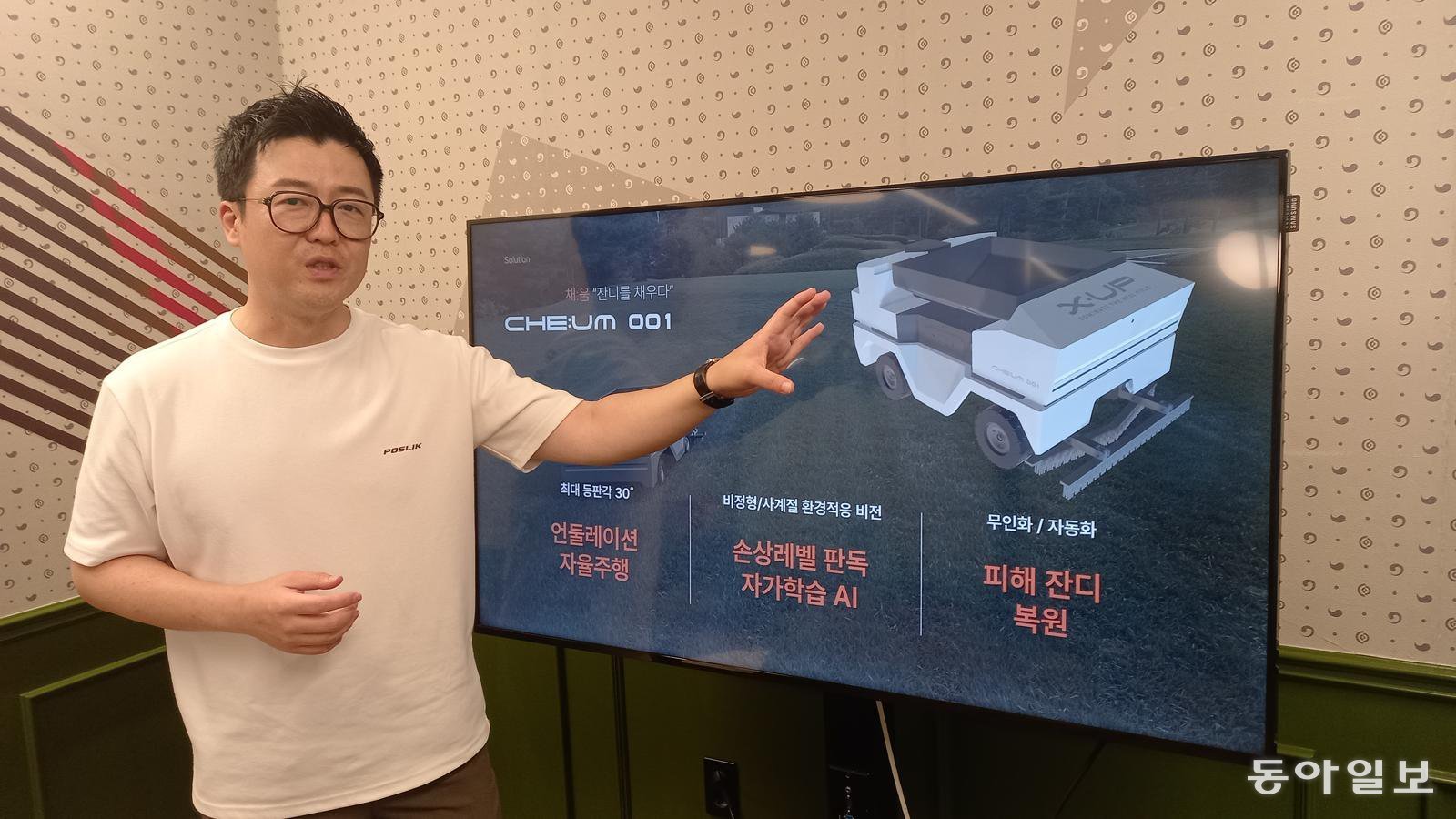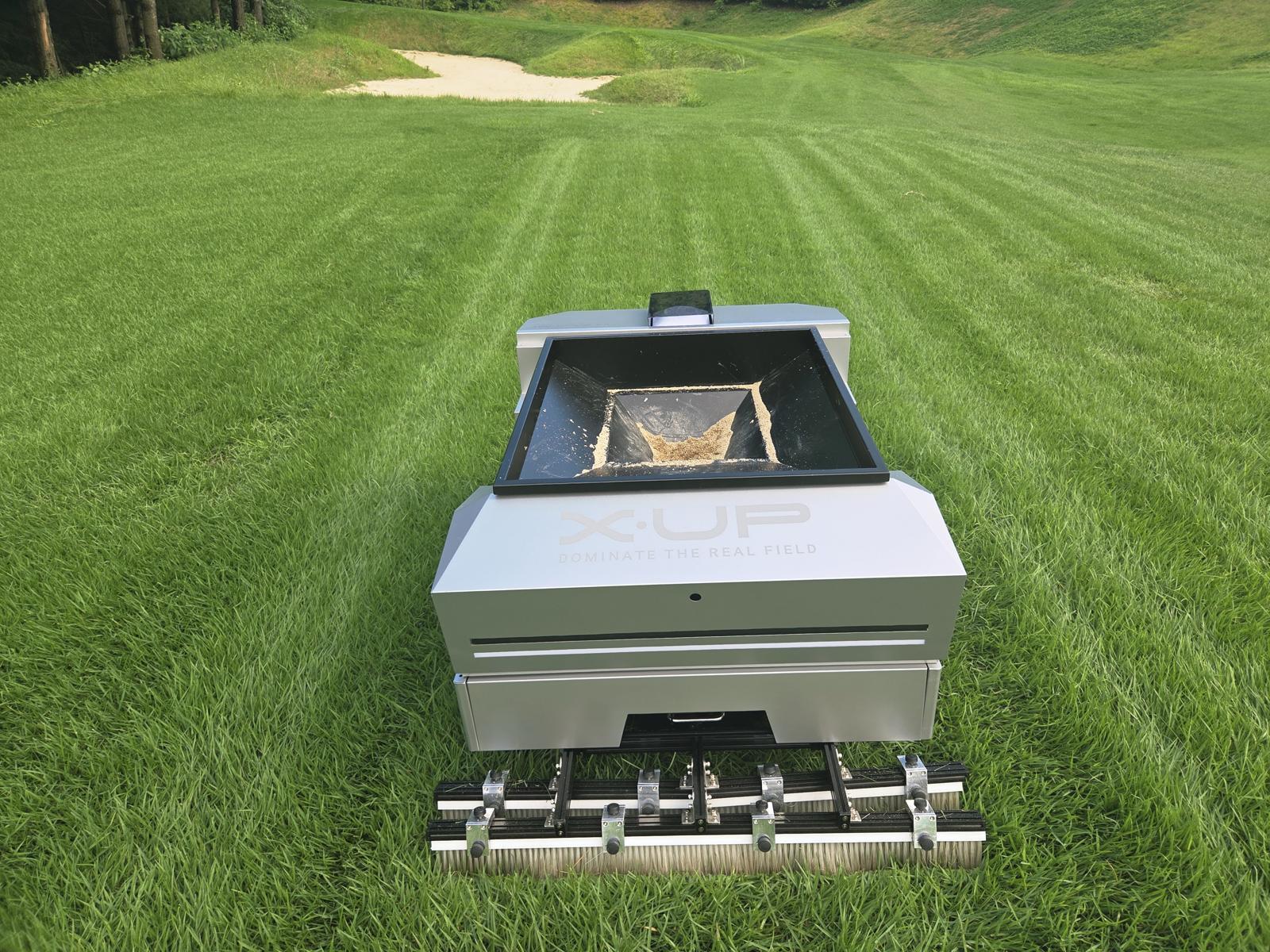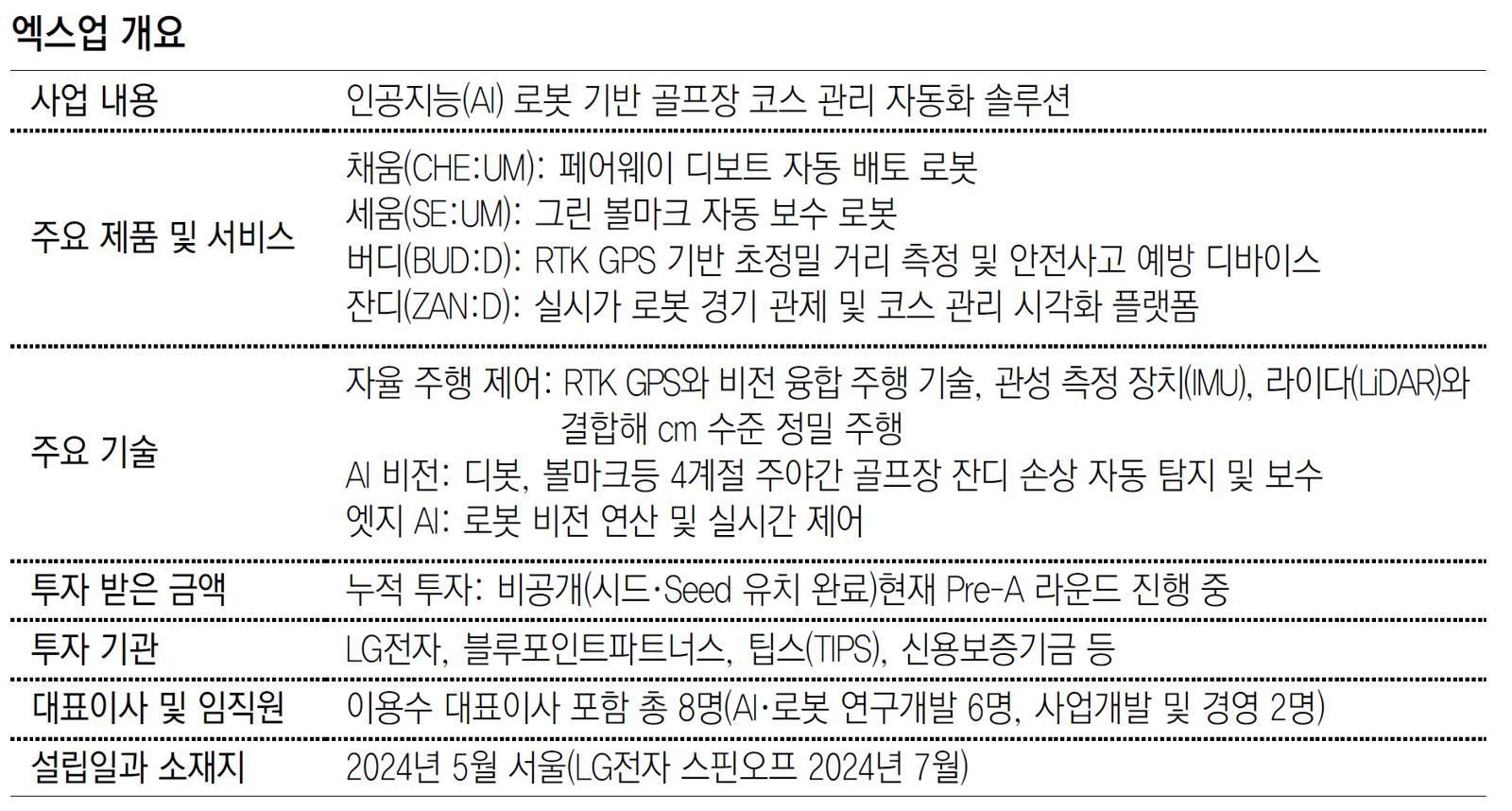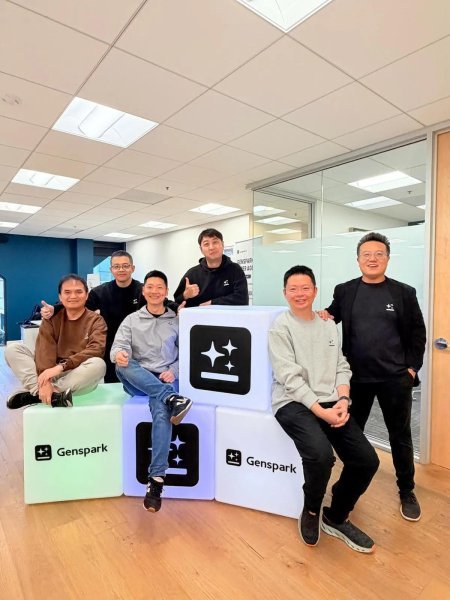
Robotics
LG Employee Develops Lawn Care Robot, Nears KRW 10 Billion Sales
Dong-A Ilbo |
Updated 2025.10.11
X-Up Pioneers Golf Course Management Robots
Developed a device reading putting lines in two weeks… Realized 'anything is possible' in surprise
Formed an internal team and founded a company in three months… Discovered a 'new market' in golf course management recruitment challenges
Created a divot repair robot in less than a year… Ambitions to expand beyond the field into defense sector
Developed a device reading putting lines in two weeks… Realized 'anything is possible' in surprise
Formed an internal team and founded a company in three months… Discovered a 'new market' in golf course management recruitment challenges
Created a divot repair robot in less than a year… Ambitions to expand beyond the field into defense sector
Lee Yong-soo, CEO of X-Up, explains the autonomous day and night golf course divot repair robot 'Chaeum' at the company's office in Gangnam, Seoul, on the 2nd. Lee stated, "Chaeum was developed with large golf markets such as the United States and Japan in mind, as well as the domestic market." - Reporter Heo Jin-seok jameshur@donga.com
An engineer who had worked at LG Electronics for 15 years experienced the generative AI ChatGPT, released at the end of the previous year, while attending a dispatch education program at Seoul National University in early 2023. This encounter shifted his career goal from becoming an LG executive to a startup CEO. Despite never having written a line of code, he has now developed a robot that manages golf courses for the first time in the world and is preparing to enter both domestic and international markets simultaneously.On the 2nd, Lee Yong-soo, CEO of X-Up (42), was met at the company's office in Gangnam-gu, Seoul. X-Up is ushering in an era where robots replace the manual labor of golf course turf maintenance. Lee stated, "Golf courses are struggling to find people to maintain the turf," and added, "We have proven the maintenance performance of the robot through field demonstrations. We are preparing for mass production with a target of March next year."
● Shocked by Generative AI in 2023
Lee worked for 15 years at LG Production Technology Institute, primarily responsible for developing new surface treatment methods and mechanical equipment as an automation process engineer. He would develop machinery or automation processes upon request from LG Group affiliates. Despite the stable corporate life, he always had a longing to pursue his own work. It was challenging to do what he truly wanted within the heavy corporate system.
In early 2023, he was dispatched to Seoul National University's Graduate School of Engineering for education. He said, "I got to use ChatGPT, which was released in November 2022, and it was shocking." While most people viewed the newly released technology with mere curiosity, as a science and engineering graduate, he reacted differently. With no prior coding knowledge, he managed to program an Arduino based on electronic circuits by asking ChatGPT. Within two weeks, he created an electronic device that reads golf putting lines. Experiencing AI generating code and even teaching how to compile it opened up a completely new world for him. Lee said, "I was greatly inspired by the fact that I could plan and create a device on my own." This was the decisive moment for his decision to start a business.
● Forming a Startup Team and Conducting Market Research
Starting from mid-2023, Lee began preparing for a startup and persuaded Kim Han-soo (Chief Strategy Officer of X-Up, an expert in mechanical design and big data analysis) and Jang Ho-min (Chief Product Officer of X-Up, an expert in module design and product development), who were also receiving education, to form a team. Initially, they decided to start a business by developing a device that reads putting lines, but upon advice to find a larger market, the three conducted market research together. Lee explained, "It was a startup that involved giving up a stable position in a large corporation. It was necessary to agree on the existence of a large market," sharing the background of their joint market research.
While searching for a field to combine his experience as a mechanical automation expert with newly acquired AI capabilities, the issue of the golf course management market caught his attention. The Korean golf market, which had grown to a scale of KRW 20 trillion, was shrinking after the end of the COVID-19 pandemic. Moreover, the burden of management was high as all core turf management of golf course operations relied on manual labor. Lee stated, "The fundamental problem of the golf industry is still labor-intensive golf course management." He added, "Approximately KRW 1.5 trillion is invested annually in turf management across about 600 golf courses (based on 18 holes) nationwide, with 65% of it being labor costs," and "It is a reality that 7,600 divots (grass damage caused by golf swings) occurring daily on an 18-hole golf course are repaired manually."
Lee and his co-founders applied for LG Electronics' in-house venture program 'Studio 341.' After a six-month incubation process, they were selected as one of the final five teams in March last year, earning the qualification for a spin-off (independent company separation of a business unit).
● Rapid Development of the Robot
In July last year, they officially spun off from LG Electronics and established X-Up. LG Electronics and Bluepoint Partners jointly invested KRW 400 million in startup funds. In just two months, they were also selected for the Ministry of SMEs and Startups' technology startup support program (TIPS), securing an additional KRW 500 million in research and development funds over two years.
The autonomous golf course divot repair robot 'Chaeum' working on a golf course. It performs topdressing by finding spots where the turf is damaged and filling them with sand. Provided by X-Up
X-Up's core product is the fairway divot repair robot 'Chaeum.' Chaeum combines real-time kinematic global positioning system (RTK GPS, accurate to a few centimeters, more precise than general GPS which is accurate to a few meters) and AI vision (technology that analyzes and understands visual information received through cameras or sensors using AI algorithms) to autonomously navigate golf courses, identify turf damage areas, and automatically spread sand to restore them.It can autonomously navigate golf courses, which are mainly located on mountain slopes, and accurately recognize turf damage areas by developing a seasonal environment-adaptive AI vision technology. The technology to accurately locate damage areas with only the robot's own lighting even at night is X-Up's key differentiating point. A robot that repairs golf course turf at night can operate 24 hours a day.
According to X-Up, during a demonstration conducted at a golf course in Chungbuk last August, Chaeum perfectly implemented RTK GPS-based autonomous driving, AI vision-based divot detection and automatic determination, precise topdressing (the task of adding soil between the grass on a lawn) and homogenization work, unmanned movement between holes, and obstacle avoidance functions.
Along with Chaeum, X-Up has also developed the robot 'Saeum,' which repairs ball marks (marks made by golf balls) on golf course greens. It is designed to manage golf course fairways and greens around the clock.
Additionally, X-Up has completed the development of the AI caddy service 'Buddy,' which incorporates entertainment elements to attract the 2030 generation back to golf courses. They plan to expand their product portfolio to include bunker cleaning robots, water purification robots, and weed removal robots in the future.
● Simultaneous Entry into Domestic and Japanese Markets
Achievements are emerging just over a year after the startup's inception. According to X-Up, they are conducting proof of concept (PoC) projects with large companies like Golfzon, and so far, 30 golf courses have expressed interest in adopting the solution. Lee stated, "Even without marketing, 82 golf courses, which account for 14% of all golf courses nationwide, have expressed a desire to adopt the solution. Golfzon has expressed interest in purchasing 100 units, leading to a tangible business connection."
This year's revenue is expected to be KRW 300 million. Lee stated, "Even if we supply to only half of the golf courses that have expressed interest so far, sales will exceed KRW 10 billion to KRW 20 billion in 1 to 2 years." Based on the technology verified in Korea, they are preparing to enter the Japanese and US markets. In particular, they plan to enter Japan almost simultaneously with the domestic market.
In 1921, Korea's first golf course, Hyochangwon, opened at what is now Hyochang Park in Seoul. X-Up has made it possible for robots to manage golf course courses for the first time in the 100-year history of golf course introduction in Korea.
X-Up's robot technology is expected not to be limited to golf courses. Lee stated, "With the technology that traverses golf courses, we will expand into agriculture, parks, sports facilities, and even the defense sector, growing into a standard platform for all fields beyond turf."
Heo Jin-seok
AI-translated with ChatGPT. Provided as is; original Korean text prevails.
ⓒ dongA.com. All rights reserved. Reproduction, redistribution, or use for AI training prohibited.
Popular News













